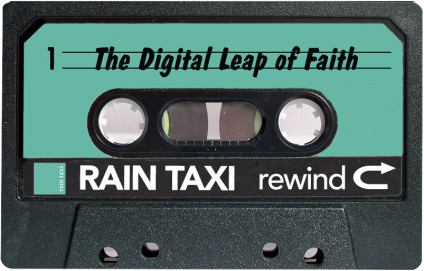 The world has gone digital. It’s a tiresome thing to say, but for an industry like publishing that often hinges on the hope that readers still want to buy physical books, it bears repeating. Sitting on a couch and reading ink on paper now represents a serious outlier in how people consume content, and it’s not a reach to say that a print book might be the only reading (or listening, or watching) a person does without a device in a given day. Yes, there are e-books, a great innovation—but hardly the final version of what electronic book publishing should and will look like. We only need to examine how shorter-form publishers are adapting in order to see the legitimately endless (and necessary) possibilities. Look at how visual poetry has started blending with new technologies as a means of not just presenting but enhancing the form. Or take Jennifer Egan’s story “Black Box,” published by The New Yorker in 2012. “Published” is an interesting term here: the 8,500-word story first ran as a serialized set of tweets over a ten-day span. That successful experiment represents a major, recognizable print publisher trying something completely new, with content from a high-profile author to boot. So which publisher is going to be the first to take a high-stakes leap into a new form of digital publishing with a full-length book? And which author will be the one to risk his or her content in these uncharted waters?
The world has gone digital. It’s a tiresome thing to say, but for an industry like publishing that often hinges on the hope that readers still want to buy physical books, it bears repeating. Sitting on a couch and reading ink on paper now represents a serious outlier in how people consume content, and it’s not a reach to say that a print book might be the only reading (or listening, or watching) a person does without a device in a given day. Yes, there are e-books, a great innovation—but hardly the final version of what electronic book publishing should and will look like. We only need to examine how shorter-form publishers are adapting in order to see the legitimately endless (and necessary) possibilities. Look at how visual poetry has started blending with new technologies as a means of not just presenting but enhancing the form. Or take Jennifer Egan’s story “Black Box,” published by The New Yorker in 2012. “Published” is an interesting term here: the 8,500-word story first ran as a serialized set of tweets over a ten-day span. That successful experiment represents a major, recognizable print publisher trying something completely new, with content from a high-profile author to boot. So which publisher is going to be the first to take a high-stakes leap into a new form of digital publishing with a full-length book? And which author will be the one to risk his or her content in these uncharted waters?
So much of book publishing is based on precedent, track records, and risk aversion, all of which make innovative leaps difficult. But if what we’re starting to see from online magazines and journals is any indicator, the e-book as we know it is just the beginning.
Rain Taxi’s best pieces on innovative digital publishing from 2012:
“Twitter Mind: on Jennifer Egan’s ‘Black Box’” (Fall 2012, Online) by John Parras, about The New Yorker’s Twitter serialization of Egan’s short story
Review by Allie Curry of Cutting Across Media by Kembrew McLeod and Rudolf Kuenzli, (Winter 2011/2012, Online) discussing the new frontier of copyright law in the digital age
Transmission: Technology, Spirit, and Embodied Self in Recent Visual Poetry (Spring 2012, Online) by Jay Besemer, on visual poetry’s expanding possibilities with modern technology
